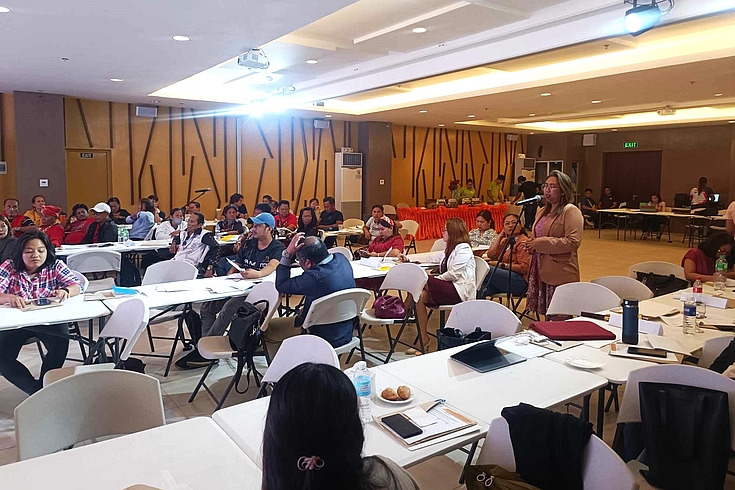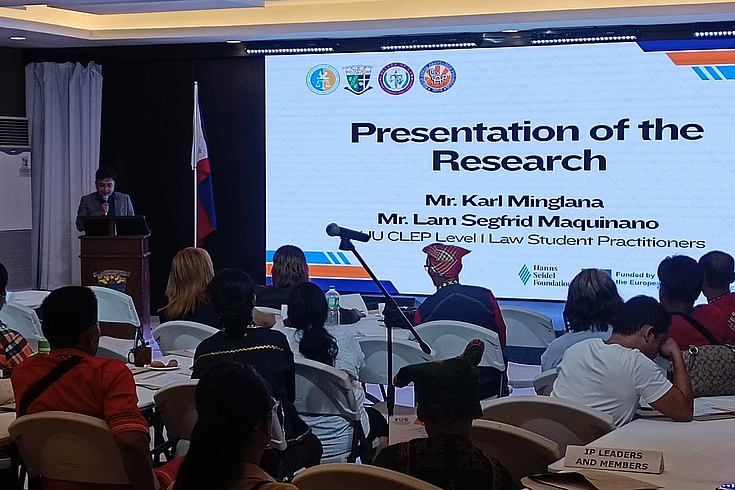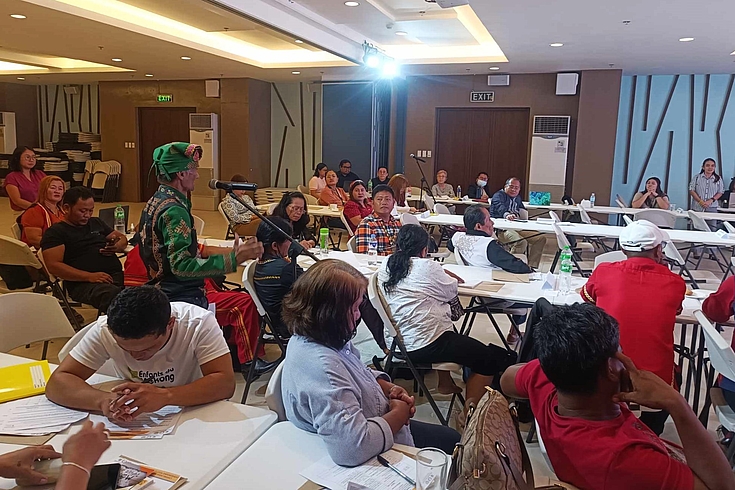Community-based Dialogues Project (CBD)
CBD on Presentation of Laws Relating to “Buya” and “Duwoy” and on the Interfacing of the Mainstream and Customary Laws Related to these Practices
CHR
It was attended by more than 60 participants representing IPs (Datus, Elders, IP Mandatory Representatives/IPMRs), IP community women and youth sector, government agencies [National Commission on Indigenous Peoples/NCIP, Public Attorney’s Office/PAO, Department of Education (DepEd) Legal Office, Butuan City Legal Office, Commission on Population and Development (PopCom), Office of the Provincial Prosecutor (Agusan del Norte), Judiciary-Regional Trial Court/RTC, Commission on Women/PCW (online)], officers and staff of FSUU-ULAP and student-volunteers, and CHR Caraga led by its Regional Director, Atty. Aurora Luanne Cembrano-Ramos, and the HSF representative.
The objectives were to: (i) raise awareness on indigenous peoples (IP) customary laws and practices vis-à-vis the mainstream laws; (ii) conduct a CBD with different indigenous peoples (IP) groups and communities in Caraga Region towards advocating for a shift in IP cultural practices that would protect IP women and girls; and (iii) surface pathways wherein the IP practices can be interfaced with that of the mainstream laws.
The Opening Remarks was given by Atty. Mary Grace Renon, ULAP Project Lawyer. She acknowledged the presence of the IP participants and partner institutions for organizing the activity. She noted that it is important to hold a dialogue and discussions on “Buya” and “Duwoy” as it affects the development and welfare of IP children, and the State’s obligations to protect the rights of children. She encouraged the participants to share their knowledge and experiences on these traditional practices toward finding a common ground in identifying strategies and resolving issues.
Atty. Gerlyn Gamolo, CHR Caraga, shared the Rationale of the activity. She intimated that the CBD is an effective tool for surfacing issues of marginalized and vulnerable sectors, and what new policies may be necessary to respond to sector-specific human rights violations (HRVs). She mentioned some of the CBDs that CHR Caraga has conducted with different sectors in the region to identify and discuss local human rights issues aimed at the resolution of the same. Given the significant number of IP communities in the region and the passage of relevant mainstream laws for the protection of children, she noted that it is an opportune time to hold a dialogue with IP leaders and elders to look into the customary practices of “Buya” and “Duwoy” and its consequences. She added that the goal is to harmonize these IP cultural practices with national laws.
CHR
The Presentation of the Research titled “Understanding the Legal Consequences of Customs and Traditions of BUYA and Duwoy” as practiced by IPs of Caraga/Mindanao was given by Mr. Lam Mequinano, FSUU Law Student Practitioner. The legal research aims to find out (1) whether or not the marriage as a result of the tradition of “Buya” (arranged marriage by parents of minor children) and “Duwoy” (polygamous marriage with first wife’s consent) are valid, and (2) whether or not persons facilitating the practice of “Buya” and “Duwoy” are criminally liable under present criminal laws (e.g. Family Code). For “Buya,” it was determined that the marriage is void in the following circumstances: (i) absence of legal capacity of parties; (ii) if any of the parties is below 18 years of age; iii) absence of marriage ceremony; (iv) absence of consent or consent is defective; (v) those who officiate marriage are not authorized by law; and (vi) absence of essential requisites of the law for a valid marriage. It concluded that “Buya” which complies with the requirements of the law is valid, otherwise it may be non-existent, void or voidable. For (2), the practice of Buya or child marriage and cohabitation of an adult with a child outside of wedlock are prohibited under RA 11596 and facilitation of such is punishable under the law. For “Duwoy” (a man is married to 2 or more wives), it was concluded that it is not recognized under the law (except for Muslims) and, therefore, void and may commit the crime of bigamy. The research recommends that the practice of “Buya,” especially child marriages, be abandoned by the IPs, and government agencies must work hard to explain to IPs the benefits of respecting the rights of their children.
The Presentation of Mainstream Laws was given by Atty. Euvic Ferrer, CHR Caraga. He shared local and international laws on the protection of children such as the UN Convention on the Rights of the Child (person below the age of 18), highlighting the (i) guiding principles: non-discrimination; best interest of the child; right to live, survive and develop; and respect for the views of the child; (ii) categories of rights: survival, developmental, protection and participation; and (iii) prohibitions under the law: facilitation of child marriage; solemnization of child marriage; and cohabitation of an adult with a child out of wedlock. He disclosed that there is this observed trend from offline to online child exploitation. He cited domestic laws on the protection of children: Law Prohibiting the Practice of Child Marriage, Anti-Child Abuse Law, Anti-Rape Law, Anti-Child Pornography, Anti-Cybercrime, Anti-Violence against Women and Children (VAWC), Anti-CSAC Law (Children in Situations of Armed Conflict), Anti-Trafficking in Persons, Juvenile Justice, among others. He mentioned salient features of the Law on Child Marriage and other laws that respect, protect and fulfill the rights of women and children. He impressed that a child marriage is a form of forced marriage, and cited a UN Children’s Fund report that almost 400 million women had been married before the age of 18 (2012) resulting in higher than average maternal and infant mortality and morbidity rates.
The Presentation of IP Laws and Traditions was given by Bae Lucy Rico, Barangay Tribal Leader, Agusan del Sur. Her PowerPoint was in Visayan language, which the undersigned translated below as to the key points she raised. Initially, she presented the process/ways of getting married in her tribe ‘Manobo’ in Agusan del Sur, namely, “Panakin,” “Buya” and “Duwoy.” She explained that in “Panakin,” the man offers his services to the family of the woman for 3-9 years prior to marriage to show his true intentions to the woman. The “Buya” and “Duwoy” practices are the same as described earlier in the research. She mentioned the ceremonies for marriage/union: “Kombite” or gathering of both families upon agreement with the man taking care of the expenses, and finally, “Pamayas” or blessing of the union. She also shared that there are instances when this process is not followed like when the couple elope or when the wife runs away with another man. When this happens, a peaceful negotiation is advised to avoid conflict or clan wars.
CHR
During the Open Forum, the participants shared their ideas and insights based on the presentations, viz: (i) the Indigenous Peoples Rights Act (IPRA) respects customary laws, how come there are other laws which amend some of its provisions? Which one should prevail?; (ii) there is a Supreme Court decision which states that the application of local customs and traditions should be consistent with national laws; further, IPRA has a repealing clause which allows parts thereof to be amended or repealed when found inconsistent with other laws; (iii) on the practice of “Duwoy,” can the first wife who chooses to have a second wife for her husband be charged of bigamy? It is possible for a case to filed in court if later on, there is a misunderstanding or conflict between the two wives.; (iv) under existing laws, polygamous marriage is only allowed under Muslim culture; (v) there is no penalty for children cohabitating but are subject for appropriate interventions through the DSWD programs; (vi) the youth representative said she does not want the practice of “Buya” to prevail under present times as it is no longer applicable/acceptable to them as they are now more empowered and want to follow their heart in choosing their partner in life; (vii) violence against men can be charged under the Revised Penal Code; (viii) there are cultural practices that should be discontinued especially for those no longer applicable/practiced and deemed harmful; (ix) “Buya” and “Duwoy” conflicts should be resolved amicably or referred to appropriate government agencies for possible resolution; and (x) the CBD aims to harmonize customary laws with national laws.
The representatives of government agencies gave their comments on the presentations and discussions. Mr. Ralph Mancao, FSUU Law Student Practitioner summarized the day’s activity.
The participants thanked the organizers for conducting the CBD on “Buya” and “Duwoy” which they found informative and enlightening (an eye-opener).
Atty. Aurora Luanne Cembrano-Ramos, CHR Caraga Officer-in-Charge gave the Closing Remarks. She expressed her sincere appreciation to the partner organizations for their invaluable contributions to the success of the activity as well as to the IP/tribal communities of Caraga region and relevant government agencies for their presence and active participation. She specifically thanked HSF for being a consistent partner in promoting human rights and CHR Caraga’s programs and advocacies, FSUU-ULAP and student-volunteers, and GO-JUST/EU for the fruitful collaboration.
Finally, the group gathered for a photo opportunity for documentation purposes.



